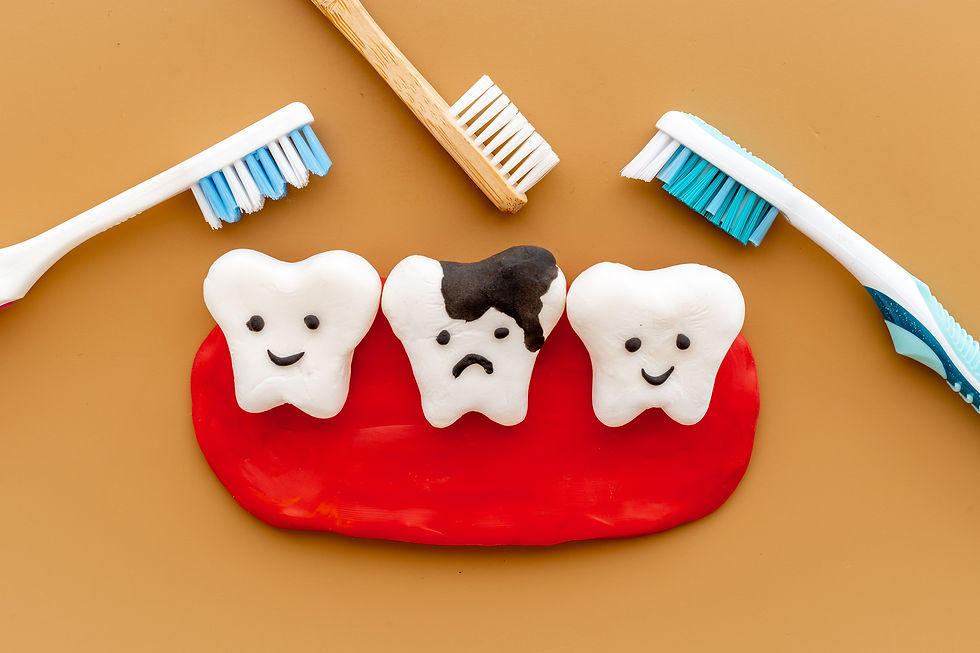All About Cavities! Your General and Emergency Dentist in Beaverton, Oregon Explains
- Emergency Dentist Beaverton

- Nov 12, 2019
- 3 min read
Updated: Jan 15, 2021
Cavities (aka dental caries or tooth decay) are one of the world’s most common diseases, with only the common cold beating it out. And because cavities attack dental enamel, which is the only part of the human body that cannot heal itself to any degree, the damage that cavities cause to our adult teeth is permanent.
Fortunately, cavities are also nearly entirely preventable with good oral hygiene and care. As with any health issue, prevention is key, and the key to prevention is knowing the cause. So, what causes cavities?

How Cavities Work:
Our teeth and gums are constantly being covered by plaque, a clear sticky film made up of bacteria, dead cells, and food debris. When plaque is not cleaned away by regular brushing and flossing, the bacteria in the plaque feeds on and breaks down sugars, creating acid. This acidic plaque grows and hardens over time, attacking tooth enamel and causing tiny openings or holes in the enamel.This is the very first stage of tooth decay.
If left untreated and tooth enamel is worn away, the cavity gets larger and attacks deeper layers of the tooth, eventually affecting the nerves and blood vessels at the center of the tooth. It can even spread to the surrounding tissues, spreading through the tooth roots to the gums and jawbone. Depending on the severity and depth of the cavity, treatment can range from a simple filling, to a root canal, to losing the tooth entirely and requiring treatment to heal the surrounding area.
This all might sound quite dire, but truthfully, tooth decay and cavities are easy to prevent! Remember, this entire process begins with the growth of plaque on our teeth, so with good oral hygiene - that’s brushing twice a day and flossing once a day - plaque should not have enough time to cause permanent damage to teeth.

How To Prevent Cavities:
First and foremost, practice good oral hygiene. This means brushing and flossing daily, and visiting the dentist regularly to detect and treat any developing issues before they get worse. In its very early stages, when tooth decay has begun weakening enamel but not yet destroyed it, it is actually possible to reverse the decay with good oral care. Besides brushing and flossing daily, good oral health tips that help strengthen our teeth include:
Cutting down on snacking; particularly sugary, starchy, and sticky foods and drinks.
Choosing mouth healthy foods and drinks, such as: cheese, eggs, dark leafy greens, crunchy veggies, wild caught fish, green and black tea, water.
Waiting 20-30 minutes after eating to brush. Our teeth are often more sensitive after eating, especially after eating something acidic.
Drinking water after eating to help neutralize acidic plaque and rinse away sugary, acidic food debris from your teeth.
Fluoridating: Be sure to drink fluoridated water and brush with an ADA-approved fluoridated toothpaste. Fluoride works wonders to remineralize our teeth, strengthening them and making them more resistant to cavities.
Some people have medical conditions that make them more prone to cavities, such as dry mouth due to medication (since saliva helps wash away plaque), or issues which increases the presence of acid in the mouth, such as chronic acid reflux or bulimia. These people should be especially vigilant about their oral health routines, but with good and regular oral care, cavities
can virtually always be prevented







